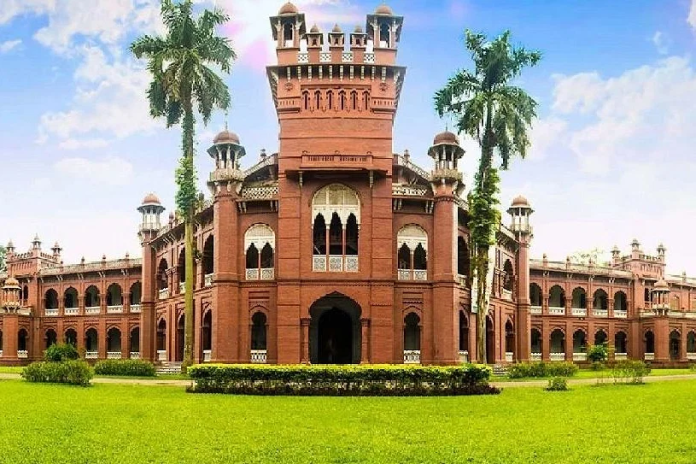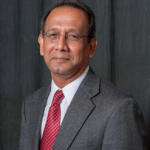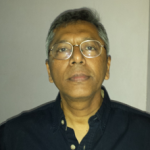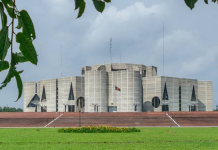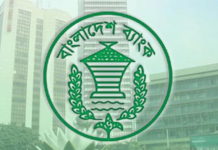Curzon Hall, Dhaka University. Courtesy: Prothom Alo (English desk), 1 Dec 2021
Thanks to our youths from both public and private schools, colleges, madrassas, and universities, Bangladesh is having a much-needed rebirth which is allowing us to have a serious introspection of our existing structure, law, and policies. More than three dozen vice chancellors (VCs) from both public and private universities have resigned already often citing “personal reasons,” the code word for having been “appointed” by the prior government for purely political reasons or family connections.
It is refreshing to see the appointment of the likes of Professor Niaz Ahmed Khan as the new VC of Dhaka University (DU), a person whose Google Advanced Scholar citation record is a significant improvement upon sixteen prior VCs. Each of these appointments, however, are being made under the terms of the very university ordinance that got them to their current sorry state. Each of these universities will have to fall back to their old ordinances in less than 5 years when there will be need again to find replacements. Irrespective of how these VCs got appointed during this extraordinary time, appointments of deans and chairpersons will continue to be subject to that same old ordinance.
It is time we understand that finding new VCs without having changed university’s current governance structure will not cure the disease, but much prolong the pain.
Dhaka University, the country’s first university – the so-called Oxford of the East, could not prevent its downward slide that begun since the promulgation of the Ordinance. The prior ordinances were viewed as not guaranteeing academic freedom even though Higher Education Institutions (HEIs) were able to have a merit-driven faculty which guaranteed a minimum standard of education.
A Dhaka University website entry describes that milestone as when “democratic norms and autonomy became integral features of the institution”. In the guise of solidifying institutional autonomy, for all practical purposes, merit-based faculty hiring, retention, and promotions that was otherwise taking place in the past got undone from the get-go.
Despite knowing full well what was happening on the ground during the last 50 plus years, sadly, too many of the stakeholders found it convenient to explain away the downward spiral of the Bangladeshi HEIs as lacking in money to fund research, books, libraries, laboratories and adequate salary and so on. While the need for larger resources is a necessary but not sufficient condition for becoming a global HEI, these knee-jerk explanations are meant often to maintain the status-quo and protect the beneficiaries themselves of the broken HEIs.
DU Ordinance of 1973 is perhaps the most significant since everything else HEI-related that was promulgated since then for the public and later for the private universities in 1992 have not changed much of the trajectories of the HEIs in Bangladesh. The ordinance ended up in effect replacing “meritocracy” with “democracy”, once and for all. This was brought upon us by an emotion-driven political process and was participated to by the then academic leaders without many thoughts or regards for the future. From then on, the so-called democratic practices would be used in identifying vice-chancellors, deans, and so forth, compromising fully the quality assurance so vital to higher education.
A total of 52,799 students left Bangladesh in 2023, up from 44,338 in 2022, for a whole host of reasons the most important of which is that HEI, with a few exceptions, have either failed or are failing in their teaching and research missions. In comparison, according to University Grants Commission (UGC), there were only 2,317 international students in the public and private universities in 2020 who came to Bangladesh. The number decreased to 2,281 in 2021 and 1,957 in 2022 perhaps due to absence of quality education and congenial atmosphere. There seems to have been a deliberate undercounting of international students from India by the ousted government given the fact that during the latest unrest, India’s Minister of State for External Affairs claimed that there are about 9,000 students.
Focus for most current students is to get into the Bangladesh Civil Service (BCS), one of the contentious areas that led to the recent student unrest which eventually resulted in the collapse of the regime on 5 August. The role of studying the actual major to which one is admitted is often secondary. The opening of newer departments serves no academic purpose nor the job market other than benefit government-aligned teachers and their collective vote bank. In effect, too many HEIs function more like teaching factories where many of their faculty members are also busy teaching at other institutions, typically private universities, to make a quick buck. The folks who are busy running between campuses have no time for teaching at either place and, surely, no time for conducting any substantive research.
The first effort to document the roots of HEI ills goes back to a 2011 report: Dhaka University: Can It Turn Around? (BDNews24.com, December 24, 2011) It was followed by the book University of Dhaka: Making, Unmaking, and Remaking which hoped “if a generation of humans got involved in making the University and sadly another generation in unmaking it then surely there is hope that, yet another generation of humans will engage themselves in remaking the University”.
Unfortunately, those who have been driving the HEIs in Bangladesh have been in continual denial as well as both unwilling and unequipped to interpret data and take necessary corrective actions. Until recently too many academics were fearful that finding flaws with a faulty ordinance might be interpreted as heretical. Those few who dared to reveal themselves, typically forward-looking young faculty members, always wanted to make sure that their identities remain shrouded. It is imperative that we reflect on the data that is indicative of the unmaking of DU and its root causes if there is any hope for “remaking the University”. That opportunity to fix the ills once and for all the universities is upon us now. Here are the reasons why.
Faculty Quality
Fish starts rotting often from the head. No sooner a compromised VC gets appointed, the ordinance itself allows for most of his or her recruited teachers to be also compromised. The status of the University Grants Commission (UGC) was not much different either. The UGC took 23 years to establish faculty promotion criteria for private universities; but 48 years for public universities!
It goes without saying, those criteria themselves are too minimalistic which will prevent both public and private HEIs from gaining much of global traction easily. The fact that it took 25 fewer years for private universities to have promotion criterion established affirms that the ordinance for private universities itself is allowing them to better their reputation at a rate faster than public universities. This is evident from the ranking trend data for the HEIs. In the next iteration or overhaul, if private universities can be made to transition from their current for-profit status to a purely non-profit status, private universities in Bangladesh can far exceed public universities in global ranking.
Politicization
The Ordinance of 1973 created originally for the governance of Dhaka University (DU) soon gave way to follow on similar ordinances for the five older public universities (Bangladesh Agriculture University, Bangladesh University of Engineering & Technology, Rajshahi University, Chittagong University and Jahangirnagar University) sought to also introduce democratization of HEI. The governing structure for all has gotten reduced to election processes for various statutory positions including those of Vice Chancellors, Deans, and Chairs – resulting in a highly politicized process dominated always by whatever suits the preservation of the country’s premier and president.
Not surprisingly, Dhaka University saw its first victims when seven students were killed gang-land-style in 1974 in Mohsin Hall. From 1991 onwards, to guarantee continuance of control, the sitting governments made sure that there was not any election of the student unions any more with faculty becoming part of the partisan subservience with students and teachers finally coming together to provide unconditional support for everything that the government wished.
The net result of these ordinances was the creation of an environment that was not any more a function of knowledge creation and dissemination, but what contributed to financial gain, promotions, graft, contracts, and more faculty positions.
Trash Journals
One of the outcomes of the 1973 University Ordinance has been an explosion of university-based low-quality journals that serve as vehicles to justify faculty promotions. A large fraction of what are published in these journals are typically plagiarized and serves to convey in effect falsity that the faculty members publishing in these venues are engaged in research of sorts. 145 of 157 journals (92.3%) that are published now in Bangladesh are trash journals that do not contribute to much of anything as far as scientific impact is concerned. Dhaka University happens to have the worst record with 17 such journals, not even one of which is yet to be associated with an impact factor. Rajshahi University and Chittagong University are right behind DU.
Explosion of departments
Dhaka University that began in 1921 with three faculties and 12 departments grew to have five faculties and 29 departments in 1973. By now, DU has 83 departments, an increase of 186% since the Ordinance of 1973. Each new department means a new head and the possibility of someone becoming a head every few years as well as more faculty members increasing the total vote bank that will get to elect chairs, deans, and vice chancellors. Faculty recruitment a.k.a. recruitment of voters has become hostage to a desire to increase a group’s political strength and has little to do with the academic qualification. A single VC of DU during his tenure gave appointments to 907 faculty members “to serve party politics” and “create a pool of loyalists”. According to the university’s registrar, at least 110 were recruited to staff newly opened departments.
Academic leadership
Here is the vicious circle. The Ordinance itself guarantees party-affiliated faculty and student politics which, in turn, guarantees explosion of the number of departments, vote banks, and swelling of low-quality faculty. To sustain most of these faculty, HEIs hold on to a subpar criterion for promotion, cultivate low-quality and questionable PhD programmes, encourage unchecked plagiarism, guarantee abundance of trash journals, and prevents unaffiliated students from voicing their opinions.
University Ordinances that exist today cannot be left to chances with a hope that they will get retuned or reengineered. It makes little or no difference now that dozens of VCs have resigned and websites of several HEIs and UGC have changed their public faces to declare their innocence. The current university ordinances must be rewritten to reverse the downward spiral of our HEIs and to inspire a race to the top. Our young students deserve better.

